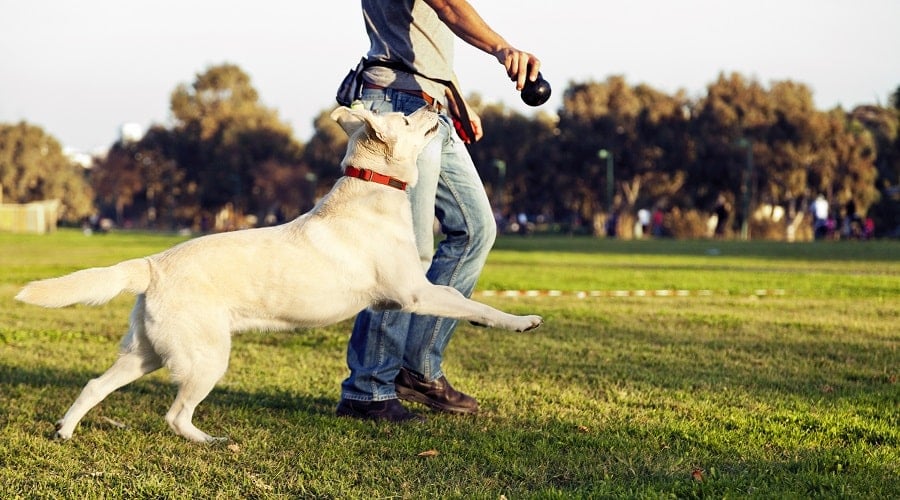Do Dogs Ever Shut Up, Or Are We Doomed Forever? Here’s The Barking Truth
When you purchase through links on our site, we may earn a commission. Here’s how it works.
Every time the doorbell rings, a truck rumbles by, or a squirrel makes eye contact with the wrong kind of confidence, my dog Falkor erupts into a barking frenzy. As a Beagle mix, he was practically born with a megaphone. My other dog, Daisy, a Lab Pitbull mix, has a bark so deep and booming it could rattle windows. Between the two of them, silence in my house is about as common as a unicorn sighting.
Table of Contents

Dogs bark for all kinds of reasons: alerting, excitement, and boredom, but do they ever get tired of barking? Sometimes, after a solid five-minute barking spree, I wonder if my dogs even hear themselves anymore. Can a dog bark nonstop? Do dogs lose their voice from barking too much? As their owner, I’d love to believe they might eventually think, You know what? That’s enough noise for today. But dogs don’t get tired of barking in the same way people get tired of talking.
Their vocal outbursts serve a purpose, whether it’s to communicate, release energy, or simply because they feel like it. So, what’s really behind all the excessive barking? And more importantly, will your dog ever shut up on their own, or are you doomed forever? The answer isn’t just a simple yes or no. Let’s break down why dogs bark, if they ever get sick of their own noise, and whether there’s actually an off switch hidden somewhere in all that chaos.
Why Do Dogs Bark So Much? 6 Real Reasons Behind The Racket
Dogs bark, sometimes at obvious things (like a delivery driver or a cat in their yard). Or sometimes at things only they seem to perceive (like ghosts, the wind, or the concept of existence). But why do dogs bark so much? While some dogs are naturally more vocal than others, barking is one of their primary ways of communicating with us and the world around them. Whether it’s out of excitement, frustration, or a sense of duty, there’s always a reason behind the racket.
1. Alerting & Protection
Dogs have an instinct to warn their humans of potential threats. Whether it’s a burglar, a squirrel, or just the neighbor taking their evening stroll. How dare they! This kind of barking, known as territorial barking, is especially common in protective breeds like German Shepherds, Dobermans, and Chihuahuas (yes, those tiny dogs take home security very seriously).
Intruder Alert! Do Something, Human!

Many times, like in the case of my Falkor hollering at me when people come to the door, he alerts me that something is happening. Dangerous or not, he wants me to know that something out of the ordinary is occurring. If the tone turns defensive and more urgent, that means there is something he perceives as a threat that he wants to protect me from.
To them, anything unfamiliar could be a potential threat, and their loud, persistent barking is their way of saying, Hey! There’s something weird happening! Pay attention! Some dogs will even bark at seemingly harmless sounds, like a door closing down the street or footsteps in the hallway, because their instinct tells them to stay on high alert. While this behavior is normal, excessive territorial barking can become an issue if your dog treats every noise as a security threat or is aggressive.
2. Excitement Overload
You step through the door after a long day, and suddenly, your dog loses their mind. Excessive barking, jumping, spinning in circles, and wagging their tail so hard they might fly off. Some dogs simply cannot contain their excitement, and barking is how they express their sheer joy.
OMG, You’re Home!

This is especially common in high-energy breeds like Labradors, Huskies, and Beagles, who seem to operate on a constant level of enthusiasm. It’s also why some dogs bark uncontrollably when they see another dog on a walk or when they know it’s time for food. Unlike territorial barking, this type of barking isn’t aggressive. It’s just their way of shouting, “THIS IS THE BEST THING EVER!”
3. Attention-Seeking
Dogs are smart. They quickly learn that barking gets a response. Whether it’s a treat, belly rubs, or just your exasperated, “What do you want?!” If barking results in attention, they’ll keep doing it. While it might be cute initially, reinforcing attention-seeking barking (by responding every time) teaches your dog that barking = rewards. If your dog constantly barks at you to get what they want, ignoring them and rewarding quiet behavior can help break the habit.
Hey, Look At Me! I’m Important!

This is why some dogs bark every time you sit down, why they demand attention when you’re on the phone, and why they suddenly start barking at nothing when you’re in the middle of a Zoom call. Small breeds like Dachshunds, Yorkies, and Pomeranians are notorious for this behavior. They are companion animals and thrive on human interaction.
4. Boredom & Loneliness
Bored dogs are noisy dogs. If your dog is barking for seemingly no reason, they might just be bored out of their mind. Dogs need mental and physical stimulation to stay happy, and if they don’t get enough exercise or engagement, barking becomes their way of passing the time.
I Have Nothing Better to Do

Breeds like Border Collies, Australian Shepherds, and Poodles are particularly prone to boredom barking because they’re highly intelligent and need constant mental stimulation. Without enough enrichment (like puzzle toys, walks, or training sessions), they’ll find their own entertainment, like barking at shadows or barking just to hear themselves talk.
Dogs left alone for long stretches, especially social breeds, may also bark out of loneliness. This can escalate into separation anxiety barking, where they cry, bark, or even howl for hours when left alone. If your dog barks excessively when you’re gone, they might need a combination of exercise, enrichment, and gradual training to help ease their anxiety.
5. Fear & Anxiety
Barking isn’t always about excitement or attention. Sometimes, it’s a sign of fear or anxiety. Dogs who feel threatened or uncomfortable may bark as a way to warn others to stay away. If your dog barks at strangers, loud noises, or unexpected movements, they may be trying to make themselves feel safe. Some dogs are naturally more anxious than others. However, fear-based barking is often seen in rescued or poorly socialized dogs who haven’t had positive exposure to new experiences.
I Don’t Feel Safe

Body language signs that your dog is barking out of fear rather than confidence include:
- Tail tucked between their legs
- Ears pinned back
- Backing away while barking
- Excessive yawning or lip licking
If your dog is barking out of fear, punishing them can make it worse. Instead, building their confidence through positive reinforcement training and slow desensitization can help them feel safer and bark less over time.
6. Habit & Breed Tendencies
Some dogs just love the sound of their own voice, and if you own one of these breeds, good luck. If you have a breed known for excessive barking, you may never be able to fully “cure” them of it. But you can train them to bark less by giving them alternative ways to communicate (like training them to ring a bell instead of barking when they want to go outside).
I Was Born To Bark

Why do Beagles, Yorkies, and Huskies bark so much? Because they’re literally bred to be vocal. Beagles and Coonhounds were trained to “bay” loudly while hunting. Huskies naturally “talk” as part of their communication style. Small terriers like Yorkies, Chihuahuas, and Dachshunds seem to bark just for the drama.
Our Personal Experience Of Owning A Naturally Barky Breed
My dog Chips is a Dachshund, which means she came pre-installed with a high-powered security alarm that never runs out of battery. I knew Dachshunds were vocal before I adopted one, but I severely underestimated just how deeply committed they are to their barking duties. Chips doesn’t just bark at the delivery person, she barks at the idea of a delivery person. Neighbors chatting in the yard? Immediate threat. The wind? Clearly up to no good. A leaf falling suspiciously close to our property? Unacceptable.
I’ve learned that reacting to the chaos only fuels the madness, so I’ve mastered the art of ignoring her dramatic outbursts. And to be fair, it’s helped. She’s reduced her barking from full-blown riot mode to a more reasonable level of daily security briefings. But let’s be honest, she’s never truly going to stop. Chips sees herself as the unofficial guardian of England, a title that my neighbors have fully embraced.
However, Chips’ relentless barking does have its perks. Despite her commitment to the cause, she actually doesn’t bark all the time at night. She’s selective with her outrage, which makes it even more terrifyingly effective. In the two years we’ve had her, she’s only unleashed her battle cry a handful of times when we’re asleep.
One of those times? 3 a.m. while the rest of us were peacefully asleep, Chips was on duty. Out of nowhere, she sounded the alarm. A deep, chesty warning (or as deep as a tiny sausage dog can muster). When we checked outside, we saw a shadowy figure rummaging through our neighbor’s skip. The moment Chips made her presence known, the intruder legged it like they’d just been caught by a Rottweiler, not an 11-pound sausage with stubby legs. To this day, I’m convinced she single-handedly saved our street from a crime spree.
Because of that, I sleep a lot easier when my husband is away for work. Some people have security systems. I have Chips, the fearless, a pint-sized protector who takes her job very seriously. Sure, she may be dramatic about the wind during the day, but when it counts at night? She’s got my back.
– Emma Braby, Rescue Dog Mom & Writer For Canine Journal
Different Types Of Dog Barking
Barks can be loud or soft and high or low-pitched, depending on the dog and the situation. A dog’s bark can vary widely in volume, pitch, and tone, depending on their breed, size, and the reason behind the barking. Some dogs have deep, booming barks that can shake a room, while others have sharp, high-pitched yaps that seem designed to pierce straight into your soul.
Context plays a role in how a dog barks, too. A short, sharp bark might signal alertness, while a series of rapid, high-pitched yaps could indicate excitement or frustration. A deep, drawn-out bark may be a warning or territorial response, while softer, lower-volume barking can be a sign of playfulness or uncertainty.
Dogs are incredibly expressive through their barking, and if you pay close attention, you can often tell what they’re feeling just by the sound and pattern of their barks. Here are several dog bark types. Do any of these sound all too familiar?
So, Do Dogs Ever Get Tired Of Barking?
If you’ve ever found yourself staring at your barking dog, wondering if they’re powered by some unholy, never-ending energy source, you’re not alone. I have asked myself this very same thing many times, especially when I’m trying to answer the door to accept a delivery or when a friend stops by unannounced, and my pups will simply not stop barking. When a dog gets going, it can feel like the barking will never stop. But do dogs ever get tired of barking?
The answer is yes and no. Most dogs will eventually stop barking. But they might not, depending on the dog breed, the reason they’re barking, and how stubborn they are. Some dogs bark for a minute or two, realize they’re getting nowhere, and move on with their lives. Others? They could go for hours as if they’re on a personal mission to break a world record.
So, is there a barking limit, or are we doomed to an eternal soundtrack of woofs and yaps? Let’s break it down.
Do Dogs Physically Get Tired From Barking?
Technically, yes, barking takes effort. It’s an action that engages their vocal cords, lungs, and overall energy reserves. But while humans might get exhausted from talking too much, dogs have remarkable endurance. Especially when their barking is driven by excitement, anxiety, or pure stubbornness.
Some dogs can bark for hours without seeming to lose steam. Particularly if they’re barking for a strongly motivated reason, like warning you about the terrifying UPS truck or demanding more treats because you only gave them one, and they know there are more.
That said, barking does take a toll on a dog over time, and eventually, they’ll need to rest. Signs that a dog is getting physically tired from barking include:
- Slower, weaker barks (their enthusiasm starts to fade)
- Pauses between barking sessions (do I keep going, or is it nap time?)
- Yawning or lying down between woofs (barking is exhausting, okay?)
- Eventually giving up and sighing dramatically (fine, I’ll stop… for now.)
Can Dogs Lose Their Voice From Barking Too Much?
Yes! Just like humans, dogs can strain their vocal cords if they go on an extended barking spree. You might notice your dog’s bark sounding hoarse or weaker after a particularly loud day. Especially if they’ve been barking non-stop at a “trespassing” squirrel that refused to leave the yard. If a dog overuses their voice, they can develop laryngitis. Which makes their bark sound different or disappear altogether. Signs of voice strain in dogs include:
- A hoarse, raspy, or weak-sounding bark
- Coughing or throat irritation after excessive barking
- Suddenly refusing to bark (I have nothing left to give, human…)
If your dog’s bark suddenly disappears or sounds significantly weaker, it’s a good idea to let them rest their voice. Which, let’s be honest, might actually be a nice break for you. In most cases, they’ll recover after a day or two of forced silence. But if their bark doesn’t return or they seem to be in discomfort, a vet visit is a good idea.
How Long Can A Dog Bark Before Stopping?
There’s no official time limit, but some dogs will go for hours if given the chance. In fact, there are reports of dogs barking for an entire day (usually when left alone) or engaging in hours-long barking competitions with neighboring dogs. Several factors influence how long a dog will bark before stopping:
- Motivation. Are they barking because of fear, excitement, boredom, or a real threat? Dogs with a strong reason to bark will keep going longer.
- Breed & Personality. Some breeds were practically built for barking marathons (I’m looking at you, Beagles, Dachshunds, and Huskies). Others bark less and prefer more efficient ways to express themselves (like Border Collies staring at you intensely until you obey them).
- Energy Levels. High-energy dogs (like Jack Russell Terriers and Australian Shepherds) have the stamina to bark for much longer than lower-energy breeds.
- Training & Reinforcement. If barking gets them what they want, they’ll keep doing it. If they’ve never been trained to stop, why would they stop?
In some cases, barking may go on indefinitely if the dog is anxious or left alone without any distractions. This is where training and environmental management become crucial. For most dogs, barking will occur in short bursts that last a few minutes or longer. Between five and 20 minutes is not unusual. Some, especially those pups left alone outside all day, may stay at it for longer.
Do Dogs Bark Themselves To Sleep?
Yes, some dogs will literally bark until they fall asleep. If your dog has ever barked their way into an exhausted nap, you’ve witnessed this phenomenon firsthand. This tends to happen when:
- A puppy is protesting bedtime (I AM NOT TIRED, AND YOU CAN’T MAKE ME SLEEP).
- A dog is left alone and barks out of frustration or anxiety.
- They bark so much they just… run out of energy.
For some dogs, barking is mentally stimulating, and they’ll keep going for as long as their energy allows. But eventually, even the most determined barker will crash and burn, if only for a brief recharge before they’re back at it.
So, Do Dogs Ever Run Out Of Barking Energy?
Yes, eventually. But the real question is whether they’re stopping because they’re tired or because they’ve moved on to something else. Some dogs bark until they need to rest. In comparison, others will stop when they get distracted by food, a new smell, or the sound of a cheese wrapper being opened from across the house.

If your dog is barking excessively and never seems to self-regulate, waiting for them to “get tired” probably isn’t the best approach. Instead, understanding why they’re barking and giving them alternative ways to communicate can help curb the noise before they feel the need to go full air raid siren.
Why Don’t Some Dogs Get Tired Of Barking?
Barking is natural for canines, which is part of why they don’t often tire of it. In fact, the more they vocalize, the more they want to keep at it, especially if they get a response. The response can come from another pup or a human, reinforcing the behavior. I have seen this first-hand in my pets. One will start barking at something (or nothing), and the other will start, too. They will then feed off each other, getting louder, until I let them outside to get out the excess energy that is building.
That said, every pup is a unique animal and has different circumstances. So, one pup may last far longer than another. Excessive barking is a problem and not something you want to let continue. If it happens more than a couple of times, it’s a good idea to reach out to the vet or an animal trainer to help identify why your pup behaves this way.
Can Dogs Lose Their Voice?
Yes, they can lose their voice. Just like humans, excessive use can cause inflammation and a sore throat. Laryngitis can develop, causing your pup to mute his woofing temporarily. Laryngeal edema occurs when excess fluid builds up and causes inflammation in the larynx. It will cause your pup to sound hoarse and raspy. Your pup will need veterinary care for inflammation or damage to the larynx to ensure a full recovery and prevent further injury.
Dogs may develop an upper respiratory infection, which may lead them to lose their voice for a short time. Our pups can also suffer from an illness or injury affecting their voice box and vocal cords. In some cases, such as severe trauma, surgery, collapsed trachea, laryngeal paralysis, hyperthyroidism, degenerative myelopathy, or other medical conditions, a dog can permanently alter or lose their voice.
Why Do Small Dogs Bark So Much?
If you’ve ever met a tiny dog with a big attitude, you might assume that small breeds are the undisputed champions of barking. And for the most part, you’d be right. Small dogs tend to bark more frequently than large dogs, but the reasons behind this go beyond just their size. So why do small dogs bark more? Here are a few reasons why.

1. They Have a Napoleon Complex (Small Dog Syndrome)
Small dogs have a well-earned reputation for being yappy and loud. They often feel the need to overcompensate for their size with a big personality and a loud bark. They need to be louder for you to notice them. Smaller breeds are often anxious and feel threatened by larger animals, new people, and new situations. They may start getting loud to take control of the situation. A Yorkshire Terrier may only weigh 7 pounds, but they firmly believe they are the guardian of the entire kingdom.
2. They’re Used To Getting Their Way
While small breeds often vocalize more, this behavior often results from a lack of training. Any size pooch may start to yap and yowl excessively if they have not had proper obedience training, want attention from their owners, or do not respond well to redirection.
Let’s be real, small dogs often get away with bad behavior because their size makes them less intimidating. If a Great Dane jumped on guests, people would be horrified. If a Chihuahua barks and jumps, people laugh and say, “Oh, how cute”. But when barking gets rewarded with attention, treats, or being picked up, small dogs quickly learn that making noise gets them what they want.
My Toy Chihuahua, Cookie, was exceptionally small, just 5 pounds as an adult. Cookie was also one of the most incessant barkers I have ever encountered. She was very demanding and wouldn’t stop until we gave in. We often joked that this tiny little girl ruled our house, and at times, that indeed seemed to be the case. In hindsight, I know I allowed her to get away with this behavior, mainly due to her petite size. I did not instill proper redirection methods when training her, which led to some of this behavior. I learned a lot from her and have been able to train my pup, Falkor, a little better.
3. They React To Everything
Because of their small size, tiny dogs are often hyper-aware of their surroundings. A shifting shadow, a creaky floorboard, a distant car door slamming. Everything is fair game for a barking spree. They’re on high alert 24/7, and sometimes, it seems like they bark just to remind you they’re still on duty.
Can I Train My Dog To Stop Barking Excessively? 6 Tips
Nuisance barking can become a big issue for owners, especially if you have close neighbors or live in an apartment. Fortunately, there are several things you can do to help stop this behavior. Training is a big part of the equation. Some pups may require more intense training than others. Below are a few methods you can use:

- A bored dog may get noisy and destructive, so provide plenty of interactive toys like puzzles that will keep them engaged for a reasonable amount of time.
- Exercise is another essential component to deter barking. Ensure that your pup has the proper amount of physical exercise every day. A tired dog is less likely to bark excessively when you’re gone and will have less pent-up energy during the day.
- Socializing your pup is also a way to help deter excessive barking. Some dogs bark too much because they are not trained to behave around other dogs and new people. The responsibility for socialization falls on the owner, so don’t be afraid to reach out for help.
- Use a verbal command and redirect. For example, you can say the words “Hush” or “Quiet” every time your dog starts vocalizing excessively. For my pups, I use the words “Leave it.” Then redirect that behavior and reward them with a treat or cuddles.
- In some cases, the best approach to stopping unwanted woofing in a pup is to not respond to the behavior, especially when other methods have not worked (including verbal responses and redirecting their attention). Dogs bark to send a message, and giving them attention acknowledges their bad behavior. When dogs bark due to anxiety or fear, responding to their barking may unintentionally reinforce their anxious behavior. Ignoring the barking breaks this cycle and helps dogs learn that barking doesn’t lead to the desired outcome. If you reward your pup when they are calm and quiet, they may learn that being quiet brings positive attention.
- Consider a no-bark collar for your pup.

In the case of my pup, Falkor, he will often whine or bark when he’s in his crate. He does not like being in the crate when people are out and about in the home or my other animals are out loose. However, I do not let him out when he starts whining and woofing. I redirect it with our phrase, “Leave it,” and then, once he has stopped, I let him out of the crate. This can cause some annoyance, as he can be loud, and other people in the home may want it to be quiet. However, we all know that we cannot give in, or we will be unable to control it in the future.
How Long Can A Dog Legally Bark For?
In the United States, many state and local governments have bark or pet noise ordinances. Believe it or not, a dog barking excessively for more than 10 or 20 minutes is illegal in some places. If you’ve ever been kept awake by a neighbor’s dog barking nonstop, you might have wondered, “Is there a legal limit on how long a dog can bark?” The answer varies depending on where you live. But yes, excessive barking can be a noise violation in many areas.
Most local laws and noise ordinances don’t specify an exact time limit for barking. But they do define what qualifies as “excessive” or “nuisance barking.” In general, a dog that barks for prolonged periods, especially during nighttime hours, can result in complaints, warnings, or even fines for the owner.
We have a dedicated guide that answers the question, How Long Can A Dog Bark Legally? So be sure to check it out if you have a forever barking Fido or if you have a four-legged nuisance neighbor.
Do You Need Help With Dog Training?
Training your fur baby is a huge task, and it’s perfectly normal to need help. Fortunately, as dog owners, we have more options than ever to help us rein in and modify our pets’ behavior. Whether you need help with excessive barking, basic commands, potty training, and destructive behavior, there are several options to consider. Several excellent online training options, like SpiritDog Training and Doggy Dan, can help address several canine behaviors. Online options are convenient, often more affordable, and can be more comfortable for pups who do not do well in crowds.

What puts your pup into a barking frenzy? Or does your neighbor’s barking dog drive you up the wall? Share your stories in our comments below.
Why Trust Canine Journal?
Danielle has shared a special bond with dogs since childhood and has had plenty of experience with dogs that bark a lot! She has over 30 years of experience with dogs of all sizes and dogs with special needs. Danielle is a dedicated professional researcher and pet product reviewer. She spends countless hours researching the latest pet care, health, food, and training developments. Her two dogs, Daisy and Falkor, serve as in-house food and product testers. Danielle works with a professional and experienced team to bring our readers the best, most accurate, and most up-to-date information.



